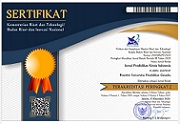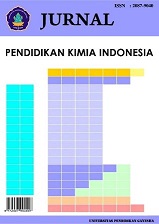The Development of Student Soft Skills through the Integration of PJBL STEAM Learning in The Organic Chemistry 1 Topic of Hydrocarbons
DOI:
https://doi.org/10.23887/jpki.v8i1.71120Keywords:
Soft skills, STEAM PjBL, Organic Chemistry 1Abstract
This research aims to improve students' soft skills in facing the 21st century, making learning more interesting and enjoyable so that the quality of human resources becomes better. This study explores how integrating Project-Based Learning (PjBL) with the STEAM (Science, Technology, Engineering, Art, and Mathematics) approach can improve students' soft skills in Organic Chemistry 1, specifically focusing on the topic of hydrocarbons. The research subjects were students taking Organic Chemistry 1 courses in the odd semester of the 2022/2023 academic year. This type of research is qualitative research with data collection techniques in the form of interviews, field observations, and reflective journals. The STEAM approach, encompassing Science, Technology, Engineering, Art, and Mathematics, is implemented through a six-stage learning process, namely providing essential questions, making a project plan, preparing a project schedule, monitoring students and project progress, assessing/testing results, and providing student experience. The research results show that students like project learning using the STEAM approach with an average questionnaire response result of 89.14% with very good criteria. 36% of students experienced problems when making project planning assignments in finding interesting ideas related to organic chemistry 1 material using the STEAM approach. The integration of STEAM in project-based learning can develop students' soft skills.
References
Abbas, R., Kadir, F. A. A., & Azmie, I. A. G. (2013). Integrating Soft Skills Assessment Through Soft Skills Workshop Program for Engineerig Students at University of Pahang: An Analysis. International Journal Research In Social Sciences, 2(1).
Apriliana, M. R., Ridwan, A., Hadinugrahaningsih, T., & Rahmawati, Y. (2018). Pengembangan Soft Skills Peserta Didik melalui Integrasi Pendekatan Science, Technology, Engineering, Arts, and Mathematics (STEAM) dalam Pembelajaran Asam Basa. JRPK: Jurnal Riset Pendidikan Kimia, 8(2), 42–51. https://doi.org/10.21009/jrpk.082.05 DOI: https://doi.org/10.21009/JRPK.082.05
Ariyatun, A. (2021). Analysis of Ethno-STEM Integrated Project Based Learning on Students’ Critical and Creative Thinking Skills. Journal of Educational Chemistry (JEC), 3(1). https://doi.org/10.21580/jec.2021.3.1.6574 DOI: https://doi.org/10.21580/jec.2021.3.1.6574
Aziz, R. (2020). Pengaruh Motivasi Belajar, Kemampuan Pemecahan Masalah, dan Hasil Belajar Terhadap Kesiapan Kerja Siswa Kelas XII Pemesinan SMK Pemuda 3 Kesamben, Blitar. Jurnal Teknik Mesin Dan Pembelajaran, 3(1), 43. https://doi.org/10.17977/um054v3i1p43-52 DOI: https://doi.org/10.17977/um054v3i1p43-52
Bell, S. (2010). Project-Based Learning for the 21st Century: Skills for the Future. The Clearing House: A Journal of Educational Strategies, Issues and Ideas, 83(2). https://doi.org/10.1080/00098650903505415 DOI: https://doi.org/10.1080/00098650903505415
Cheng, L., Antonenko, P. D., Ritzhaupt, A. D., Dawson, K., Miller, D., MacFadden, B. J., Grant, C., Sheppard, T. D., & Ziegler, M. (2020). Exploring the influence of teachers’ beliefs and 3D printing integrated STEM instruction on students’ STEM motivation. Computers and Education, 158. https://doi.org/10.1016/j.compedu.2020.103983 DOI: https://doi.org/10.1016/j.compedu.2020.103983
Dasgupta, C., Magana, A. J., & Vieira, C. (2019). Investigating the affordances of a CAD enabled learning environment for promoting integrated STEM learning. Computers and Education, 129. https://doi.org/10.1016/j.compedu.2018.10.014 DOI: https://doi.org/10.1016/j.compedu.2018.10.014
Destiana, D., Suchyadi, Y., & Anjaswuri, F. (2020). Pengembangan Instrumen Penilaian Untuk Meningkatkan Kualitas Pembelajaran Produktif di Sekolah Dasar. Jurnal Pendidikan Dan Pengajaran Guru Sekolah Dasar (JPPGuseda), 3(2). DOI: https://doi.org/10.33751/jppguseda.v2i2.1453
Djamarah, S. B., & Zain, A. (2014). Strategi Belajar Mengajar. Rineka Cipta.
Fauzan, F. (2020). PENGARUH SOFT SKILL DAN LOCUS OF CONTROL TERHADAP KESIAPAN FRESH GRADUATE DALAM ERA INDUSTRI 4.0 (STUDI PADA PRODI MANAJEMEN UNIHAZ BENGKULU). Creative Research Management Journal, 2(2). https://doi.org/10.32663/crmj.v2i2.1105 DOI: https://doi.org/10.32663/crmj.v2i2.1105
Firdaus, I. (2017). Urgensi Soft Skills Dan Character Building Bagi Mahasiswa. Jurnal TAPIs, 13(1).
Gafour, O. W. A., & Gafour, W. A. S. (2021). Creative Thinking skills-A Review article. Journal of Education and E-Learning, 4(1).
Gunawan, I., Benty, D. D. N., Kusumaningrum, D. E., Sumarsono, R. B., Sari, D. N., Pratiwi, F. D., Ningsih, S. O., Putri, A. F., & Hui, L. K. (2019). PENGARUH GAYA KEPEMIMPINAN, KEMAMPUAN MANAJERIAL, EFIKASI DIRI, DAN PRESTASI BELAJAR TERHADAP KESIAPAN KERJA MAHASISWA. Jurnal Manajemen Dan Supervisi Pendidikan, 4(1), 126–150. https://doi.org/10.17977/um025v4i22020p126 DOI: https://doi.org/10.17977/um025v4i22020p126
Han, S., Rosli, R., Capraro, M. M., & Capraro, R. M. (2016). The effect of Science, technology, engineering and mathematics (STEM) project based learning (PBL) on students’ Achievement in four mathematics topics. Journal of Turkish Science Education, 13(Specialissue). https://doi.org/10.12973/tused.10168a
Handayani, D. (2021). The Effect Of Whatsapp Application Assisted PjBL Model And Zoom Meeting On Learning Outcomes Of Capita Selecta. International Journal of Chemistry Education Research. https://doi.org/10.20885/ijcer.vol4.iss2.art2 DOI: https://doi.org/10.20885/ijcer.vol4.iss2.art2
Handayani, D., Winarni, E. W., Sundaryono, A., Firdaus, M. L., & Alperi, M. (2022). The Development of Organic Chemistry Teaching Materials on The Topic of Lipid Using Android STEM Based Approach. International Journal of Interactive Mobile Technologies, 16(3). https://doi.org/10.3991/IJIM.V16I03.28959 DOI: https://doi.org/10.3991/ijim.v16i03.28959
Herowati, H. (2023). ANALISIS PENERAPAN MODEL PEMBELAJARAN PROJECT BASED LEARNING (PjBL) MATERI PERUBAHAN FISIKA DAN KIMIATERHADAP KEAKTIFAN BELAJAR PESERTA DIDIK. Journal of Innovation Research and Knowledge, 2(12). https://doi.org/10.53625/jirk.v2i12.5672 DOI: https://doi.org/10.53625/jirk.v2i12.5672
Hu, C. C., Yeh, H. C., & Chen, N. S. (2020). Enhancing STEM competence by making electronic musical pencil for non-engineering students. Computers and Education, 150. https://doi.org/10.1016/j.compedu.2020.103840 DOI: https://doi.org/10.1016/j.compedu.2020.103840
Jauhariyyah, F. R., Suwono, H., & Ibrohim. (2017). Science, Technology, Engineering and Mathematics Project Based Learning (STEM-PjBL) pada Pembelajaran Sains. Prosiding Seminar Pendidikan IPA Pascasarjana UM, 2.
Kanematsu, & B. (2016). STEM and ICT Education in Intelligent Environments. Springer International Publishing. DOI: https://doi.org/10.1007/978-3-319-19234-5
Latifah, S., Junaidi, & Sari, A. F. K. (2020). PERSEPSI MAHASISWA AKUNTANSI TENTANG KEILMUAN AKUNTANSI DAN SOFT SKILL (BAHASA INGGRIS DAN TEKNOLOGI INFORMASI) TERHADAP KESIAPAN MENGHADAPI TANTANGAN ERA REVOLUSI INDUSTRI 4.0. E-Jra, Vol. 09 No(05).
Lucas, G. (2003). Instructional Module Project-Based Learning.
Moursund, D. G. (2003). Project-Based Learning Using Information Technology. International Society for Technology in Education.
Mu’minah, I. H. (2021). Studi Literatur: Pembelajaran Abad-21 Melalui Pendekatan Steam (Science, Technology, Engineering, Art, and Mathematics) dalam Menyongsong Era Society 5.0. Prosiding Seminar Nasional Pendidikan, 3.
Mulder, W. R. S. P., Khoiri, N., & Hayat, M. S. (2023). Validitas media pembelajaran IPA berbasis web dengan pendekatan STEAM untuk meningkatkan kemampuan berpikir kreatif peserta didik. Practice of The Science of Teaching Journal: Jurnal Praktisi Pendidikan, 2(1), 11–17. https://doi.org/10.58362/hafecspost.v2i1.31 DOI: https://doi.org/10.58362/hafecspost.v2i1.31
Musa, F., Mufti, N., Latiff, R. A., & Amin, M. M. (2012). Project-based Learning (PjBL): Inculcating Soft Skills in 21st Century Workplace. Procedia - Social and Behavioral Sciences, 59. https://doi.org/10.1016/j.sbspro.2012.09.315 DOI: https://doi.org/10.1016/j.sbspro.2012.09.315
Nurfitriyanti, M. (2016). Model Pembelajaran Project Based Learning Terhadap Kemampuan Pemecahan Masalah Matematika. Formatif: Jurnal Ilmiah Pendidikan MIPA, 6(2). https://doi.org/10.30998/formatif.v6i2.950 DOI: https://doi.org/10.30998/formatif.v6i2.950
Nuriyah, N. (2014). Evaluasi pembelajaran: Sebuah Kajian Teori. Jurnal Edueksos, 3(1), 73–86. https://doi.org/10.1165/rcmb.2013-0411OC DOI: https://doi.org/10.1165/rcmb.2013-0411OC
Panjaitan, J., Simangunsong, I. T., & ... (2020). IMPLEMENTATION OF HOTS BASED PROJECT BASED LEARNING (PjBL) TO CREATE INNOVATIVE LEARNING MEDIA. … Pendidikan Fisika.
Pratiwi, F. I., & Effendi, E. (2023). Development of STEAM-PjBL Integrated LKPD on Molecule Shape Materials for Class X Senior High school. Journal of Educational Sciences, 7(2). https://doi.org/10.31258/jes.7.2.p.213-223 DOI: https://doi.org/10.31258/jes.7.2.p.213-223
Ramlall, S. (2014). The Value of Soft-Skills in the Accounting Profession: Perspectives of Current Accounting Students. Advances in Research, 2(11). https://doi.org/10.9734/ijpss/2014/11000 DOI: https://doi.org/10.9734/AIR/2014/11000
Raudatul Jannah, & Abdul Syukur. (2022). Pelatihan Penerapan Desain Lembar Kerja Peserta Didik (LKPD) Berbasis STEM Materi Pencemaran Lingkungan Untuk Meningkatkan Keterampilan Sains Dan Sikap Ilmiah Peserta Didik MTsN 4 LOTIM. Jurnal Pengabdian Magister Pendidikan IPA, 5(2), 229–233. https://doi.org/10.29303/jpmpi.v5i2.1607 DOI: https://doi.org/10.29303/jpmpi.v5i2.1607
Rohma, S., Lorensia, S., Albawani, A., Handayani, R., & Astutik, S. (2023). Analisis pengaruh integrasi pendekatan stem dalam pembelajaran fisika terhadap kemampuan berpikir kreatif siswa SMA. Jurnal Pendidikan Fisika Tadulako Online, 11(1), 42–47.
Salame, I. I., & Nazir, S. (2019). The Impact of Supplemental Instruction on the Performance and Attitudes of General Chemistry Students. International Journal of Chemistry Education Research, 3(October), 53–59. https://doi.org/10.20885/ijcer.vol3.iss2.art1 DOI: https://doi.org/10.20885/ijcer.vol3.iss2.art1
Setiawati, D., & Mayasari, M. (2021). PENGARUH SOFT SKILL DAN HARD SKILL TERHADAP KESIAPAN KERJA LULUSAN SMA NEGERI 3 KOTA JAMBI DI MASA PANDEMI COVID 19. SJEE (Scientific Journals of Economic Education), 5(1). https://doi.org/10.33087/sjee.v5i1.92 DOI: https://doi.org/10.33087/sjee.v5i1.92
Sukmadinata, N. . (2009). Metode penelitian Pendidikan. Remaja Rosdakary.
Titu, M. A. (2015). Penerapan model pembelajaran project based learning (PjBL) untuk meningkatkan kreativitas siswa pada materi konsep masalah ekonomi. Prosiding Seminar Nasional, 9.
Trianto. (2014). Model Pembelajaran Terpadu: Konsep, Strategi, dan Implementasinya dalam Kurikulum Tingkat Satuan Pendidikan (KTSP). Bumi Aksara.
Wei, L., Shang, C., & Chen, X. (2022). The Use of Knowledge Management-Based Information Collaborative Learning Tool in English Teaching Classroom. Wireless Communications and Mobile Computing, 2022. https://doi.org/10.1155/2022/6367007 DOI: https://doi.org/10.1155/2022/6367007
Wena, M. (2014). Strategi pembelajaran inovatif kontemporer: suatu tinjauan konseptual operasional. Bumi Aksara.
Wibowo, B. K. (2015). Peranan Manajer Sumber Daya Manusia (Sdm) Dalam Penarikan (Rekruitmen) Di Era Masyarakat Ekonomi Asean (Mea). Stie Semarang, Issn:2252-826, 7(3).
Xie, Y., Fang, M., & Shauman, K. (2015). STEM Education. Annual Review of Sociology, 41(April), 331–357. https://doi.org/10.1146/annurev-soc-071312-145659 DOI: https://doi.org/10.1146/annurev-soc-071312-145659
Yakman, G., & Lee, H. (2012). Exploring the Exemplary STEAM Education in the U.S. as a Practical Educational Framework for Korea. Journal of The Korean Association For Science Education, 32(6). https://doi.org/10.14697/jkase.2012.32.6.1072 DOI: https://doi.org/10.14697/jkase.2012.32.6.1072
Downloads
Published
How to Cite
Issue
Section
License
Copyright (c) 2024 Dewi Handayani, Nurhamidah Nurhamidah

This work is licensed under a Creative Commons Attribution-ShareAlike 4.0 International License.
Authors who publish with the Jurnal Pendidikan Kimia Indonesia agree to the following terms:
- Authors retain copyright and grant the journal the right of first publication with the work simultaneously licensed under a Creative Commons Attribution License (CC BY-SA 4.0) that allows others to share the work with an acknowledgment of the work's authorship and initial publication in this journal.
- Authors are able to enter into separate, additional contractual arrangements for the non-exclusive distribution of the journal's published version of the work (e.g., post it to an institutional repository or publish it in a book), with an acknowledgment of its initial publication in this journal.
- Authors are permitted and encouraged to post their work online (e.g., in institutional repositories or on their website) prior to and during the submission process, as it can lead to productive exchanges, as well as earlier and greater citation of published work. (See The Effect of Open Access)





